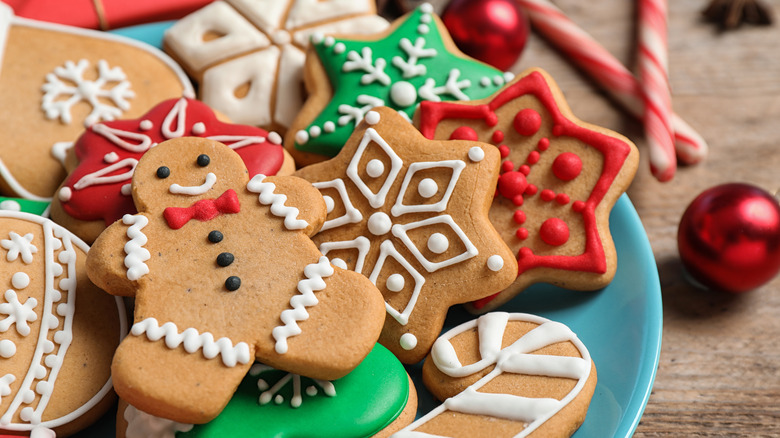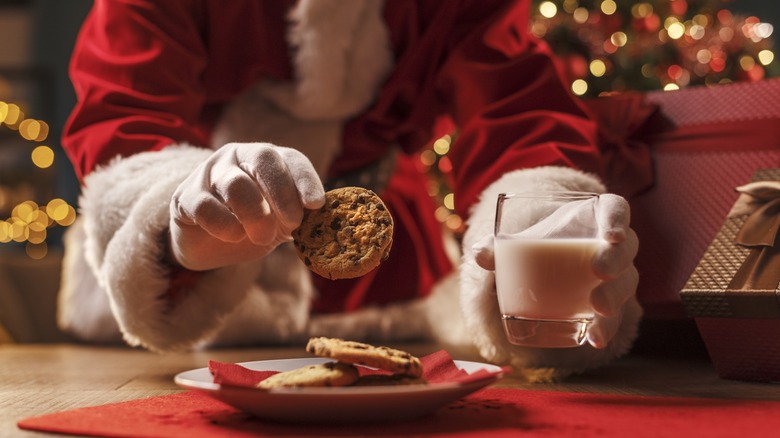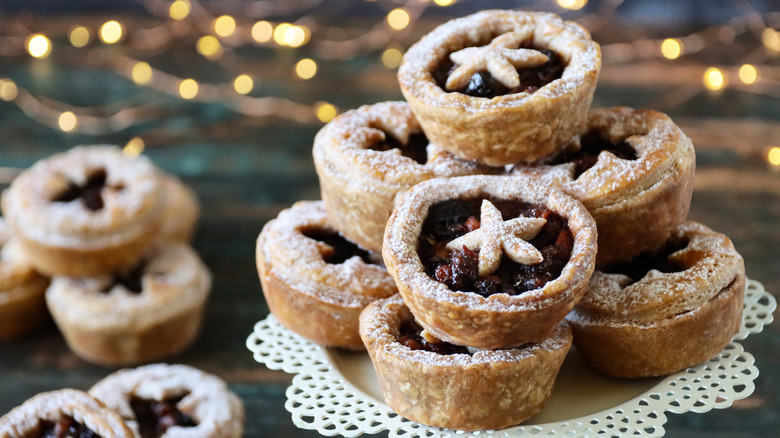The Saintly Reason We Leave Cookies Out During Christmas
There's no getting around the sheer confluence of cookies you'll encounter over the course of the Christmas season. Chocolate chip, gingerbread, sugar, almond ... the list goes on and on, and you'll likely have had at least a bite or two of each before the New Year's ball drops. Furthermore, there's no stronger fan of the Christmas cookie than that jolly icon of the holidays, Santa Claus. Setting out cookies for the arrival of Santa Claus has been an American tradition since the mid-1930s but where and why did it begin?
Well, like many long-standing customs, it's tough to pinpoint in exact detail because there are a number of different theories! Historians go back and forth on the exact origin story of many of the time-honored Christmas traditions, and the act of cookie-offering is certainly chief among them. However, it is most commonly believed that the concept of leaving out cookies on Christmas Eve traces its roots all the way back to the (aptly named) feast of Saint Nicholas! The Christian bishop, who Santa Claus is based on, had his own Dutch holiday celebrated annually where offerings of cookies and other treats factored prominently.
Before Santa, there was Saint Nicholas
Since Santa is a timeless, magical being, his influence has been cast over the wondrous youth of the world for practically eons. In the Middle Ages, during the annual December feast of Saint Nicholas, Dutch monks would utilize their access to sugar, flour, and spices to make cookies as an offering to the saint. They would also be available to travelers who came to pay their respects, presaging the idea of gift-giving and goodwill that Christmas has long been associated with. According to another legend, leaving treats out for a Santa-like entity began with Norse children leaving food out for Odin's horse Sleipner with the hope that it would cause Odin to stop and leave gifts. The same tradition still holds true today in countries where its said that Santa's sleigh isn't pulled by reindeer (sorry, Rudolph!) but by horses instead.
The actual act of leaving proper cookies for Santa, though, wasn't officially popularized in America until the 1930s, when parents encouraged their children to leave the jolly old elf some milk and cookies, to teach them kindness, giving, and empathetic behavior. Kids, and the young at heart, still extend this offering to their beloved Santa to this day, not only as an act of kindness, but perhaps as a sly way to ensure there are a bunch of presents for them once Christmas morning dawns! Pretty sneaky, but you've got to pull out all the stops for the big man in red!
Santa doesn't just eat milk and cookies
Have no fear if you aren't one for baked goods, however! Because it isn't just cookies that get left out on the 24th! That offer of Christmas Eve kindness varies from country to country, depending on their local customs. For example, in Ireland, as one might surmise, a pint of Guinness is left out alongside the cookie dish for the likely appreciative Santa. In England, instead of cookies and milk, Santa is left a nice mince pie and a glass of sherry for a hearty interlude during his journey. The children in Denmark put out a heaping bowl of rice pudding for Kris Kringle which, according to Danish legend, must be left out for him lest he become angered. German traditions dictate that Santa must be left a friendly note instead of anything edible, typically decorated festively and exchanged for the gifts left the next day. Any way you look at it, you've got to leave the big guy something for his troubles!
No matter what country you may find yourself in this yuletide season, the next time you go to set out those fresh-baked cookies (or alcoholic beverages) for ol' Saint Nick, take comfort in the fact that you're participating in a tradition that's been going on for centuries. Hopefully the cookies have been made a little more recently than that, but no judgement if they haven't ... Santa's all magic, so I'm sure that extends to his gastrointestinal system, too.


